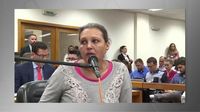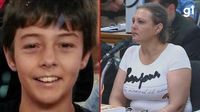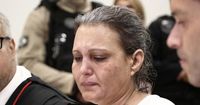Edelvânia Wirganovicz, convicted in the notorious case of Bernardo Uglione Boldrini, was found dead on Tuesday, April 22, 2025, inside the Instituto Penal Feminino in Porto Alegre. The 51-year-old's death was confirmed by the Polícia Penal, which indicated preliminary findings suggest she may have taken her own life.
Wirganovicz had been serving a sentence of 22 years and 10 months for her role in the 2014 murder of 11-year-old Bernardo, whose tragic story captured national attention and sparked outrage across Brazil.
In a dramatic turn of events, just last week, the court had authorized the progression of Bernardo's stepmother, Graciele Ugulini, to a semi-open regime. Graciele, who was also convicted in connection with the murder, is currently serving her sentence at the same facility.
According to the official statement from the authorities, Edelvânia was found with signs of hanging, and the investigation has been initiated by both the Polícia Civil and the Instituto Geral de Perícias to determine the circumstances surrounding her death. The Corregedoria-Geral do Sistema Penitenciário is also monitoring the inquiry.
The case of Bernardo Boldrini is one of the most shocking in recent Brazilian history. Bernardo was reported missing on April 4, 2014, when he went to sleep at a friend's house in Três Passos, a small town in the state of Rio Grande do Sul. His father, Leandro Boldrini, initially reported him missing, claiming he had not returned home.
After days of searching, Bernardo's body was discovered buried in a shallow grave near the Mico River in Frederico Westphalen, approximately 80 kilometers from Três Passos. The discovery came ten days after his disappearance, leading to a wave of grief and anger from the community.
Following the investigation, Leandro Boldrini, his wife Graciele Ugulini, and Edelvânia were arrested on the same day the body was found. They were suspected of being involved in the murder, with allegations of physical and emotional abuse against Bernardo surfacing during the investigation.
At the time of his disappearance, Bernardo had reportedly expressed feelings of abandonment and had sought legal intervention to live with another family, highlighting the family's troubled dynamics. His maternal grandmother, Jussara Uglione, revealed that the child was often mistreated by his stepmother, stating, "She wouldn’t let him enter the house until his father arrived." Additionally, a former babysitter indicated that Bernardo received little attention from his father and stepmother.
In May 2014, the authorities arrested Edelvânia's brother, Evandro Wirganovicz, on suspicion of aiding in the concealment of Bernardo's body. This led to charges of qualified homicide and concealment of a body against all four individuals involved: Leandro, Graciele, Edelvânia, and Evandro.
The first trial in March 2019 resulted in convictions for all four, but Leandro Boldrini successfully appealed, claiming an unfair trial. A new jury was convened in March 2023, where he was sentenced to 31 years and eight months in prison for qualified homicide and ideological falsehood, while Graciele received a sentence of 34 years and seven months.
Edelvânia, who had been a close friend of Graciele, was found guilty and sentenced to 22 years and 10 months. Her brother, Evandro, was sentenced to nine and a half years, completing his term in January 2024.
After serving time under house arrest due to overcrowding in the prison system, Edelvânia returned to a semi-open regime in February 2025, shortly before her death. The circumstances surrounding her death raise questions about the mental health support available to inmates and the conditions within Brazil's prison system.
The tragic case of Bernardo has left a lasting impact on Brazilian society, prompting discussions about child welfare, domestic violence, and the responsibilities of parents and guardians. The attention surrounding Edelvânia's death may reignite public interest in the case and the broader issues it represents.
As the investigation into her death unfolds, many in Brazil are left to ponder the legacy of a case that highlighted the darkest aspects of family dynamics and the tragic consequences of neglect and abuse.









